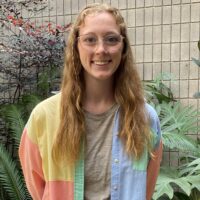
Foraging Distance of Honey Bees with Deformed Wing Virus
Deformed wing virus (DWV) is a common RNA virus exacerbated in honey bees (Apis mellifera) by Varroa mites. DWV is at epidemic levels in honey bees and poses a major concern for beekeepers. Additionally, DWV can be transmitted from managed honey bees to wild native bee species via shared floral resources. At high levels, DWV can cause deformed wings and altered foraging behavior. However, even low levels could decrease honey bee foraging and flight distances. The present study investigated the correlation between foraging distance and viral load in honey bees foraging on Common Milkweed (Asclepias syriaca) at varying distances from an apiary. Although neither trend was statistically significant, we found that DWV-positive honey bees tended to be found at greater distances from the apiary, while viral loads tended to decrease. We hope to repeat this experiment with a larger sample size of honey bees and apiaries. Additionally, combining data on DWV with other pathogen tests may provide better insight into factors that influence foraging abilities. Ultimately, understanding the impact of deformed wing virus on honey bee flight distances would enrich our knowledge of behavioral impacts of this virus on honey bees. From a conservation standpoint, it could also help predict where and when apiaries might pose a threat to native bee populations and help guide apiary placement in sensitive habitats.
My time as an intern has been an amazing experience that has inspired me to pursue a career in academic research. The networks set up by the program, such as social mentors and lunches with seminar presenters, were unique and informative in my experience. Through the conversations I had via these opportunities, my understanding of graduate school has greatly improved. The members of the McArt lab are extremely kind, contributing to a positive and fun community. They are eager to teach and sparked my curiosity in a subject I never thought I would enjoy researching so much. I have enjoyed being part of a lab’s day-to-day workings, learning new lab techniques, and working with my mentor. Through the BTI REU experience I gained confidence in conducting research, learned about a vast number of topics in plant biology, and had fun with the rest of the cohort! I am excited to apply what I have learned about conducting research and applying to graduate school in the future.
